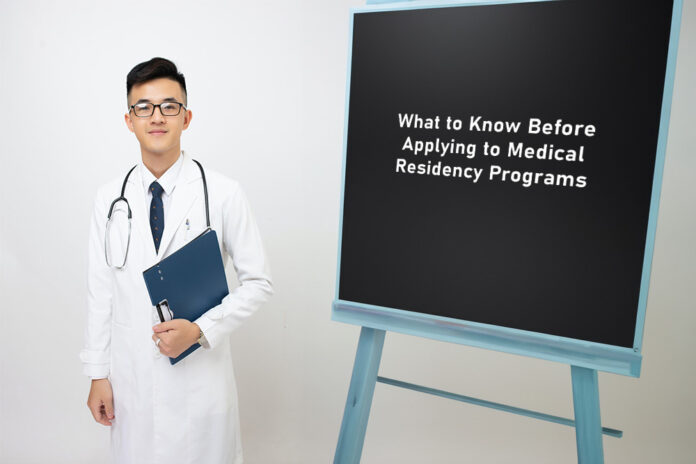Whether you’re a medical student just about to graduate or an experienced healthcare professional looking to advance your career, applying to medical residency programs can be a daunting process. With so many different types of programs to choose from, a complex application process, and intense competition for spots, it’s important to be well-prepared before you begin.
In this article, you’ll be given a comprehensive overview of what to expect when applying to medical residency programs, including the different types of programs available, the application process, tips for crafting a strong application, and what to expect during the interview process.
What Are Medical Residency Programs?
Medical residency programs are postgraduate training programs that provide hands-on experience in a specific medical specialty. These programs are typically 3-7 years in length and provide training in areas such as internal medicine, surgery, pediatrics, and psychiatry, among others.
During your residency, you’ll work closely with experienced physicians and other healthcare professionals to develop your skills and knowledge in your chosen specialty. You’ll also have the opportunity to work with patients and gain practical experience in diagnosing and treating illnesses.
Medical residency programs are highly competitive, so it’s important to choose a program that aligns with your interests and career goals. There are many different types of medical residency programs available, each with its own unique features and requirements.
The Different Types of Medical Residency Programs
There are several different types of medical residency programs available, including categorical programs, preliminary programs, and advanced programs.
Categorical programs are the most common type of residency program and offer comprehensive training in a specific specialty. These programs typically last 3-7 years, depending on the specialty, and provide a structured curriculum that covers all aspects of the specialty.
Preliminary programs, on the other hand, are one-year programs that are designed to provide foundational training in a specialty.
These programs are typically followed by a categorical residency program and are often used as a stepping stone for medical students who are not yet sure which specialty they want to pursue.
Finally, advanced programs are designed for physicians who have already completed a preliminary year in a specialty and are looking to gain further specialized training. These programs typically last 2-3 years and provide advanced training in a specific subspecialty.
When choosing a medical residency program, it’s important to consider the length of the program, the specialty, and the program’s reputation and accreditation.
The Application Process for Medical Residency Programs
The application process for medical residency programs can be complex and time-consuming, so it’s important to start early and be well-prepared.
The first step in the application process is to register with the National Resident Matching Program (NRMP). This program provides a centralized matching service for medical residency programs and is used by most programs in the United States.
Next, you’ll need to gather all of your application materials, which will typically include your medical school transcript, letters of recommendation, and a personal statement. It’s important to start preparing these materials early and to give yourself plenty of time to revise and polish them.
Once you’ve gathered all of your application materials, you’ll need to submit them through the Electronic Residency Application Service (ERAS). This service allows you to submit your application materials to multiple programs at once and is a convenient way to streamline the application process.
Tips for Crafting a Strong Medical Residency Application
Crafting a strong medical residency application is essential if you want to stand out from the competition and increase your chances of getting accepted into a program. Here are some tips to help you create a strong application:
Tip #1: Start the Application Early
One of the most important things to keep in mind when applying for a medical residency program is to start the application process early. This means that you should begin researching residency programs and gathering all the necessary materials well in advance of the application deadline. Starting early will give you plenty of time to carefully research and evaluate each program, as well as to prepare all the necessary documents, such as your transcripts, letters of recommendation, and your residency personal statement.
When you start the application process early, you will also have more time to prepare for and take any required exams, such as the USMLE or COMLEX. These exams are an important part of the residency application process, and you’ll want to make sure that you have plenty of time to study, review, and practice before taking them. By starting early, you’ll be able to avoid the stress and anxiety that can come with rushing to complete your application at the last minute.
Starting early also gives you the opportunity to reach out to mentors and colleagues for advice and support. They can help you evaluate your strengths and weaknesses, review your application materials, and provide feedback on your personal statement. With their help, you’ll be able to craft a standout application that showcases your skills, passion, and potential as a medical professional.
Tip #2: Be Specific About Your Unique Qualities
When applying for a medical residency program, it’s important to remember that you are competing against a large pool of highly qualified candidates. To stand out from the crowd, you’ll need to highlight your unique qualities and qualifications on your application.
This means that you should take the time to carefully evaluate your skills, experiences, and achievements, and identify what sets you apart from other candidates.
One effective way to showcase your unique qualities is to be specific and concrete in your application materials. For example, rather than simply stating that you are a hard worker or a team player, provide specific examples of times when you demonstrated these qualities.
Use concrete examples to illustrate your strengths, and be sure to highlight any experiences or achievements that demonstrate your potential as a medical professional.
Another way to showcase your unique qualities is to tailor your application materials to each individual program. Research each program carefully, and try to identify what qualities and qualifications they are looking for in candidates.
Then, tailor your application materials to highlight those specific qualities and qualifications. By showing that you have done your research and are a good fit for the program, you’ll be much more likely to stand out from the crowd.
Tip #3: Highlight Your Achievements
When applying for a medical residency program, it’s important to highlight your achievements and accomplishments. This means that you should include a detailed list of your academic achievements, research experience, clinical experience, and any other relevant experiences or accomplishments.
Be sure to provide specific details about your achievements, such as any awards or honors you have received, any publications you have authored or co-authored, and any presentations you have given.
In addition to highlighting your achievements, it’s also important to explain why these achievements are relevant to your future career as a medical professional.
For example, if you have conducted research in a specific area of medicine, explain how this research has prepared you for a career in that field.
If you have completed a clinical rotation in a specific specialty, explain how this experience has prepared you for further training in that specialty.
By highlighting your achievements and explaining their relevance to your future career, you’ll be able to demonstrate your potential as a medical professional and show that you are a strong candidate for a residency program.
Tip #4: Be Professional on Your Application
When applying for a medical residency program, it’s important to present yourself as a professional and competent candidate. This means that you should pay close attention to the formatting, grammar, and tone of your application materials.
Be sure to proofread your materials carefully, and ask a mentor or colleague to review them as well. Use a professional and appropriate tone throughout your application, and avoid using slang or informal language.
It’s also important to follow all application instructions carefully and to submit all materials on time and in the correct format. Failure to follow instructions or to submit materials on time can reflect poorly on your professionalism and competence as a medical professional.
In addition to presenting yourself as a professional candidate, it’s also important to demonstrate your passion and commitment to medicine. This means that you should be prepared to discuss your reasons for pursuing a career in medicine, as well as your goals and aspirations for your future career.
By demonstrating your passion and commitment to medicine, you’ll be able to show that you are a dedicated and motivated candidate for a residency program.
What to Expect During the Medical Residency Interview Process
Once you’ve submitted your application materials, you’ll need to prepare for the interview process. This typically involves interviewing with faculty members or other healthcare professionals at the program you’re applying to.
During the interview process, you’ll be asked a variety of questions about your experiences, qualifications, and goals. It’s important to be well-prepared for these questions and to be able to articulate your strengths and goals clearly.
It’s also important to be professional and courteous during the interview process. Dress professionally, arrive on time, and be prepared to ask thoughtful questions about the program.
The Importance of Networking in the Medical Residency Field
Networking is an essential part of the medical residency field and can help you build valuable connections with other healthcare professionals in your specialty. This can be particularly helpful when it comes to finding job opportunities or advancing your career.
To network effectively in the medical residency field, it’s important to attend conferences, join professional organizations, and stay active on social media. Be sure to also reach out to other healthcare professionals in your specialty and build relationships with them over time.
Conclusion on Medical Residency Programs
Applying to medical residency programs can be a challenging process, but with the right preparation and dedication, you can increase your chances of success. By choosing the right program, preparing your application materials thoroughly, and networking effectively, you can take the first step toward a fulfilling and rewarding career in the medical field.
As you embark on this exciting journey, remember to stay focused on your goals and to be persistent in pursuing your dreams. With hard work and determination, you can achieve your dream of becoming a healthcare professional and making a positive difference in the lives of your patients.
Read Also
- Student Perspectives: The Importance of Healthcare Education in CollegeInnovation, science, and empathy all come together in healthcare. Its significance cannot be emphasized as a fundamental component of any community. However, healthcare education must constantly evolve to provide the best possible support to anyone in need. The future of healthcare is integrated and immersive, prompting a full shift in healthcare education to foster leaders… Read more: Student Perspectives: The Importance of Healthcare Education in College
- What to Know Before Applying to Medical Residency ProgramsWhether you’re a medical student just about to graduate or an experienced healthcare professional looking to advance your career, applying to medical residency programs can be a daunting process. With so many different types of programs to choose from, a complex application process, and intense competition for spots, it’s important to be well-prepared before you… Read more: What to Know Before Applying to Medical Residency Programs
- What is the difference between CSO 001 and CSO 002?Are you preparing for the CompTIA Cybersecurity Analyst (CySA+) certification exam? If so, then you might have come across two important exam codes – CSO 001 and CSO 002. But what are they exactly, and how do they differ from each other? In this blog post, we’ll explore the differences between these two exams and… Read more: What is the difference between CSO 001 and CSO 002?
- 8 Advanced Degrees for Sociology MajorsLet’s say you’ve made it through your undergraduate studies in sociology with flying colors and are ready to take your academic career even further. But what advanced degree path should you pursue? Whether you’re eager to stay within the field of sociology or push yourself outside of it, there’s an abundance of degree programs to… Read more: 8 Advanced Degrees for Sociology Majors





